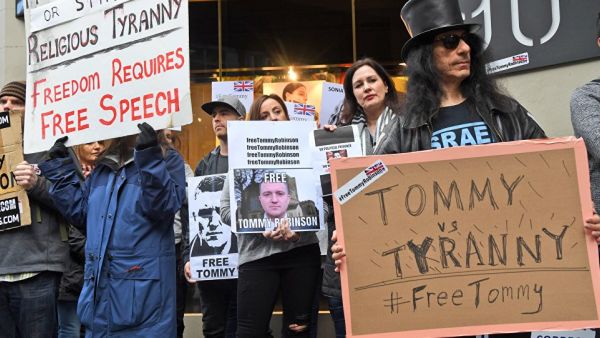Tommy Robinson is the comeback king of the far-right. The British far-right activist’s public profile has risen and fallen over the past ten years. But the last two have been pivotal. Now, he has powerful friends and supporters across the world, including – perhaps– the US presidential administration. To some extent, this shows how discomfortingly far the far-right has travelled. But in the case of Tommy Robinson, his resurgence didn’t happen organically.
A network of American far-right lobbyists seemed to identify potential for Tommy Robinson to advance their goals, since they have been investing in him for the past year and a half. Given the storm of publicity that Robinson’s recent release from a short stint in prison created, they certainly seem to be getting something for their money.
But what exactly did conservative multi-millionaire lobbyists from America want from a fringe British far-right activist who once made a living running a sunbed shop in Luton?
Background: Steven Yaxley-Lennon
Tommy Robinson is not his real name. He was born Steven Yaxley-Lennon, to English and Irish parents with blue-collar jobs in the town of Luton. The young Tommy Robinson was apparently academically gifted, and received a competitive apprenticeship in aircraft engineering at Luton Airport.
However, he lost the job almost immediately after assaulting a police officer in a drunken brawl, and spent a year in prison. He describes his turn to far-right politics after his release as having been triggered by Islamist demonstrations against the British Army.
He founded the English Defence League (EDL) group after a 2009 demonstration by Al Mujahiroun, a group led by the notorious radical preacher Anjem Choudhary. Al Mujahiroun activists provoked outrage on the streets of Luton when they burned poppies (a symbol of military respect in Britain) at a parade commemorating soldiers who had died in Afghanistan.
The EDL quickly gained notoriety for widespread, and sometimes violent, demonstrations across the country that claimed to be against the spread of Islamist extremism. The movement’s official line disavowed racism and claimed only to focus on Islam, although rhetoric from their supporters often contradicted this stance.
But whilst the movement gained plenty of media attention and made Robinson a household name, he was always seen as a fringe figure – one with a loud voice, but not an especially powerful one. Whilst with the EDL, he was convicted of fraud and jailed for trying to leave the country on someone else’s passport.
Rebel Media
He left the EDL after his release in 2013, and for a time seemed to moderate his views, saying that combatting extremism needed the support of moderate Muslims. But this was soon abandoned, and he began pushing his way back into far-right activism.
However, for a long time he seemed to have lost the public’s interest. As The Guardian recollected, just over two years ago, Robinson was struggling to attract a couple of hundred supporters as he tried to launch the UK branch of Pegida, the German anti-Islam organisation.
Pegida UK never managed to rally support for a second march, and Robinson might have been consigned to a has-been, had it not been for the interest of a Toronto-based fringe media group called The Rebel Media.

Tommy Robinson working for The Rebel Media (AFP)
The Rebel Media is a website founded in 2015, which employs a number of personalities. The Rebel Media has rejected the “alt-right” label in the wake of the Charlottesville rally, and fired one of its presenters after she appeared on a podcast with Neo-Nazi website The Daily Stormer. However, it continues to showcase presenters with far-right and anti-Islam leanings. Though it styles itself as a media outlet, its work is a long way from journalism in the traditional sense. Tommy Robinson’s tenure with them was a case in point. His work for The Rebel Media consisted of a mix of blog posts and televised “reports”, the latter of which got him in trouble again.
Performance Media
In September 2017, Robinson, as part of The Rebel Media, tried to televise an ongoing rape trial in Kent in which the defendants are Muslim. He turned up at the courthouse during the trial, and was warned by the police to leave or risk being charged with contempt of court, (a British law under which it is illegal to try and prejudice a jury’s opinion).
But then in May 2018, Robinson live-streamed an hour long video on Facebook outside a courthouse in Leeds where another rape trial was ongoing. This was in violation of a court order that restricted reporting on the case in order to protect the process. The judge feared that the statements Robinson was making would collapse the trial.
Robinson was arrested for contempt of court and sentenced to thirteen months in prison. But to his supporters, this was not a matter of protecting a judicial process – it was a free speech issue. An appeal against his sentence was mounted, and on August 1stthe appeal was upheld and Robinson was freed on bail. His case was won on the grounds that he had been sentenced too quickly after his arrest, and he has been freed on bail.
Financial Backing?
How Robinson ended up with The Rebel Media in the first place is not entirely clear. But he is described on the group’s website as a “Shillman Fellow”. And this is where things get complicated. Robert Shillman is an American tech billionaire, the head of security-scanner manufacturer Cognex Corp. He is also an established donor to conservative causes, with a hardline ethos. He told Reuters that he doesn’t “give a f***” about how he’s perceived, and is prepared to withdraw funding from groups he disagrees with. He has sponsored highly controversial competitions to draw cartoons of the Prophet Muhammad, and has also funded right-wing pro-Israeli organisations. And he also funds these “fellowships” at The Rebel Media.
However, these fellowships are managed by another organisation – the David Horowitz Freedom Centre, of which Shillman is a board member. The Centre describes itself as “dedicated to the defense of free societies whose moral, cultural and economic foundations are under attack by enemies both secular and religious, at home and abroad”.
According to the Southern Poverty Law Centre, David Horowitz’s foundation was initially focused on popular culture and trying to establish a conservative wing of Hollywood, which he saw as a cultural battleground. Horowitz himself later reoriented the group to focus on “the efforts of the radical left and its Islamist allies to destroy American values.” Whilst the Centre does not explicitly state its position in regard to Islam, it has funded a number of high profile figures who state their anti-Islam position very clearly.
The most famous is the firebrand Dutch politician Geert Wilders. Wilders has called for a ban on the Quran, on headscarves and on all non-western immigration to Europe, and has made clear that he sees Islam as a whole (rather than just extreme Islamism) as an existential threat to Europe. Horowitz paid for Wilders’ speaking fees, and travel and security expenses for a number of American visits. He also said he agreed with Wilders’ frequent comparisons between “Mein Kampf” and the Quran.
The Role of the Middle East Forum
The David Horowitz Center was not Wilders’ only American backer. A right-wing, pro-Israeli think-tank called the Middle East Forum (MEF) has also funded Wilders. The MEF paid for Wilders’ legal defence in 2010 and 2011 when he was facing charges of inciting racial hatred.
According to Reuters, the MEF stated at the time on its website that its principal goals included protecting “… the freedom of public speech of anti-Islamist authors, promoting American interests in the Middle East and protecting the constitutional order from Middle Eastern threats”.
MEF’s founder Daniel Pipes was always a controversial figure. He was named to the board of the United States Institute of Peace by President Bush in 2003, but the move was roundly condemned by Democrats and Pipes was replaced. Objections to Pipes stemmed from apparent Islamophobia in his writings.
Pipes initially denied having Islamophobic leanings, although his denials became far less vigorous after he wrote a column praising Wilders, as well as several virulently anti-Muslim statements that Wilders made. Pipes has since spoken several times at the David Horowitz Freedom Centre, and moves in similar circles to Horowitz and Shillman.
The Rebel Media founder Ezra Levant also receives grant money from the Middle East Forum. And Pipes has made his uncompromising approach to both Middle Eastern policy and to culture wars clear. He made a speech at the David Horowitz Centre in which he said:
“I would like to see an Israeli victory and a Palestinian defeat. The Middle East Forum calls this the Israel Victory Project…. we're building an intellectual base, working with allies in think tanks, sponsoring research: what precisely does victory mean? We want to be prepared with that other approach, one that which pushes negotiations aside as futile and counterproductive, and puts off negotiations until after defeat. Then talks will be productive; but until then, it's war and our side needs to win.”
But Pipes and the MEF have another victory that they are now trumpeting. “Tommy Robinson Free – MEF Heavily Involved” is the lead article on their website at the time of writing. This is because the MEF financed a “Free Tommy” rally in London, and paid for a number of high-profile far right figures to address the crowd, including Geert Wilders. The MEF also announced that it was funding Robinson’s legal defence.

Protesters scuffle with police at the junction of Whitehall and The Mall (Picture: AFP)
It’s clear that the MEF, its wealthy friends, and the global far-right see potential in Tommy Robinson, and have done for some time. And the best description of what it is they see in him come from exchanges made by former Trump adviser and far-right celebrity Steve Bannon.
Indeed, if rumours are to be believed, Bannon might be looking to give Robinson a job in his new political outfit, which aims to empower right-wing, anti EU parties across Europe. Bannon described Robinson as “a working class guy”, and, in an expletive-filled rant at a British radio producer, he said “You f***king liberal elite. Tommy Robinson is the backbone of this country.”
Steve Bannon – as a former Hollywood producer and investment banker for Goldman Sachs – is hardly a credible slinger for “elite” as an insult, (something that could equally be said for many of Robinson’s American supporters). But this is where Robinson is so useful to them.
Populism vs. the 'Elite'
Robinson’s working class roots – alongside his boldness and undeniable ability to rally a crowd – complement the narrative Bannon and his far-right fellow travelers are pushing; one in which “liberal” is the detached domain of the “elite” who are trying to shut out the concerns of working people. Meanwhile, they say, those working people are being silenced for speaking out. Robinson’s latest prison sentence set that stage further.
There is plenty of truth to this narrative of social classes being divided by liberalism. There is also plenty of untruth in it too, although both sides of the political divide are guilty of implying tolerance is a value of the elite. Either way, the narrative has been proven to work, and Robinson is very good at working it.
A Globally Connected Nationalism?
There is a further reason that the American far-right is taking such an interest in a British activist. And that is because they need to push an image of global solidarity. It might also be odd to think of nationalist, far-right movements as globally connected, given that they often espouse an explicitly anti-globalist ideology. But whether they like it or not, the far-right also live in a world where consciousness is globally influenced.
Bannon made that clear in another anecdote, when he described French far-right politician Marine Le Pen asking him to come and speak at one of her rallies. Bannon asked her what he should say. She replied “We’re not alone”. It seems the supporters, as well as the leaders, want to feel that too. 35% of Twitter posts with the hashtag #FreeTommy came from America, and supporters from Australia and other European countries were also significantly represented.
The nationalist right has gone global. And unless it can be met with a more compelling alternative, one that makes those who have been left behind by inequality and globalization feel hope, then their ideology will continue to spread.







